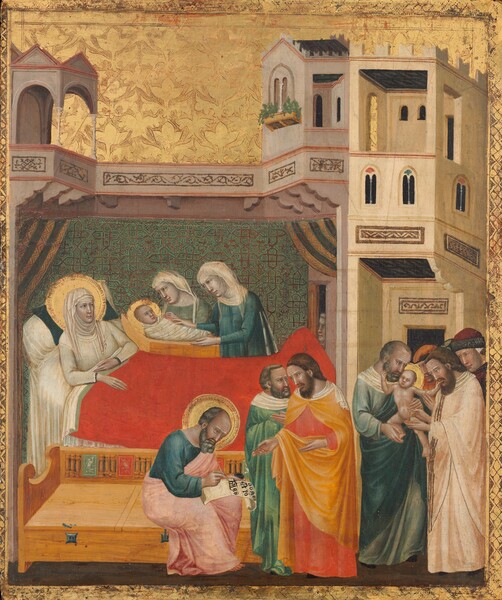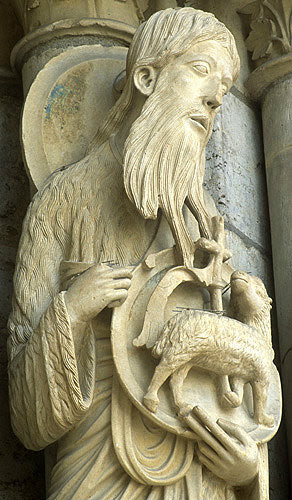"And you will have joy and gladness, and many will rejoice at his birth"
Luke 1:14
Saint John the Baptist is one of the few saints who have two feast days.
June 24th the Church celebrates the Solemnity of the Nativity of Saint John the Baptist, and on 29 August, we will celebrate the memorial of his martyrdom. There is no other saint for whom the Church celebrates both of these moments. Generally, it celebrates only their “birth into heaven”, with the exception, of course, of Jesus, the Son of God (25 December – his birth; and Good Friday – his death) and the Virgin Mary (8 September – her birth; and 15 August – her Assumption into heaven).
Jesus himself said, “Amen, I say to you, among those both of women there has been none greater than John the Baptist” (Mt. 11:11). He was the last of the great prophets of Israel, the first to testify to Jesus, who initiated a baptism for the forgiveness of sins and, in this context, baptized Jesus; he was a martyr who died defending the Judaic law.
As early as the 4th century, we find a liturgical commemoration for Saint John the Baptist celebrated on a variety of dates. The date of 24 June was established based on Lk 1:36a where speaking of Elizabeth it says, “this is the sixth month for her who was called barren”, therefore, six months before Christmas. Since the 6th century, this Feast also had a vigil.
Why does the Church celebrate the Nativity of John the Baptist?
Only three birthdays are celebrated on the Church’s liturgical calendar, the Nativity of Our Lord (December 25), the Nativity of His Mother (September 8), and the Nativity of His forerunner, John the Baptist, on June 24. Saint John the Baptist was set apart from the womb to prepare the way of the Lord and was a significant figure connected to the Incarnation and the Redemption. The Church honors him because of his role in preparing the way for Christ.
Saint John the Baptist’s Story
Jesus called John the greatest of all those who had preceded him: “I tell you, among those born of women, no one is greater than John….” But John would have agreed completely with what Jesus added: “[Y]et the least in the kingdom of God is greater than he” (Luke 7:28).
John spent his time in the desert, an ascetic. He began to announce the coming of the Kingdom, and to call everyone to a fundamental reformation of life. His purpose was to prepare the way for Jesus. His baptism, he said, was for repentance. But one would come who would baptize with the Holy Spirit and fire. John was not worthy even to untie his sandals. His attitude toward Jesus was: “He must increase; I must decrease” (John 3:30).
John was humbled to find among the crowd of sinners who came to be baptized the one whom he already knew to be the Messiah. “I need to be baptized by you” (Matthew 3:14b). But Jesus insisted, “Allow it now, for thus it is fitting for us to fulfill all righteousness” (Matthew 3:15b). Jesus, true and humble human as well as eternal God, was eager to do what was required of any good Jew. Jesus thus publicly entered the community of those awaiting the Messiah. But making himself part of that community, he made it truly messianic.
The greatness of John, his pivotal place in the history of salvation, is seen in the great emphasis Luke gives to the announcement of his birth and the event itself—both made prominently parallel to the same occurrences in the life of Jesus. John attracted countless people to the banks of the Jordan, and it occurred to some people that he might be the Messiah. But he constantly deferred to Jesus, even to sending away some of his followers to become the first disciples of Jesus.
Perhaps John’s idea of the coming of the Kingdom of God was not being perfectly fulfilled in the public ministry of Jesus. For whatever reason, when he was in prison he sent his disciples to ask Jesus if he was the Messiah. Jesus’ answer showed that the Messiah was to be a figure like that of the Suffering Servant in Isaiah. John himself would share in the pattern of messianic suffering, losing his life to the revenge of Herodias.
Saint of the Day Short Audio
John challenges us Christians to the fundamental attitude of Christianity—total dependence on the Father, in Christ. Except for the Mother of God, no one had a higher function in the unfolding of salvation. Yet the least in the kingdom, Jesus said, is greater than he, for the pure gift that the Father gives. The attractiveness as well as the austerity of John, his fierce courage in denouncing evil—all stem from his fundamental and total placing of his life within the will of God.
Saint John the Baptist is the Patron Saint of Baptism
Baptism serves as the first sacrament one receives when entering the Catholic Faith. It is a sacrament of initiation
(which you can only receive one time),
meaning once you received it, you officially enter into the body of Christ, the Catholic Church.
The origin and foundation of Christian Baptism is Jesus.
Before starting his public ministry, Jesus submitted himself to the baptism given by John the Baptist.
The waters did not purify him; he cleansed the waters. . . . Jesus did not need to be baptized because he was totally faithful to the will of his Father and free from sin. However, he wanted to show his solidarity with human beings in order to reconcile them to the Father. By commanding his disciples to baptize all nations, he established the means by which people would die to sin – Original and actual – and begin to live a new life with God.
In Baptism, the Holy Spirit moves us to answer Christ’s call to holiness. In Baptism, we are asked to walk by the light of Christ and to trust in his wisdom. We are invited to submit our hearts to Christ with ever deeper love.


